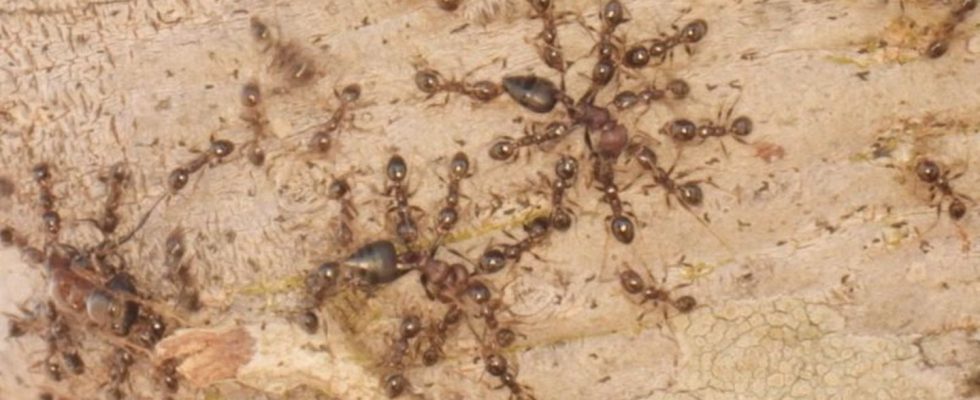Animals
Ants change the hunting success of lions
Non-native large-headed ants (Pheidole megacephala) drive away native crematogaster ants. photo
© Pat Milligan/University of Wyoming/dpa
Can a tiny ant have influence over the king of the African savanna? And how! An invasive species is making it harder for lions in Kenya to hunt their favorite prey.
According to researchers led by Douglas Kamaru from the University of Wyoming, the chain reaction began like this: alien large-headed ants (Pheidole megacephala) drove out native Crematogaster ants. These live in the thorns of flute acacias (Vachellia drepanolobium) and behave like bodyguards: If a herbivore dares to nibble on “their” tree, they pounce on it within seconds and bite painfully. Even African elephants (Loxodonta africana) are deterred by it.
Small animals, big impact
“To our great surprise, we found that these small ants are incredibly strong defenders and essentially stabilized the tree cover in these landscapes, allowing the acacia trees to survive in a place with so many large herbivorous mammals,” explained co-author Todd Palmer from the University of Florida. However, large-headed ants, which are believed to come from an island in the Indian Ocean, do not defend the trees.
Flute acacias make up more than 70 to almost 100 percent of all woody trunks in the region, the study continues. Without the protective ants, elephants eat and break five to seven times more of the trees. This is where the lions come into play: They use the privacy of the acacia trees to stalk their favorite prey – plains zebras (Equus quagga). The simple equation: fewer trees mean less hunting success. With the spread of large-headed ants, the number of zebras killed by lions has dropped noticeably, according to the research team.
Consequential invasion
“We often find that it’s the little things that make the world go round,” Palmer said. “These tiny invasive ants appeared maybe 15 years ago and none of us noticed because they are not aggressive towards large animals, including humans. Now we see that they are affecting landscapes in very subtle ways, but with devastating effects change.”
The study authors report that the lion population has not yet decreased. Presumably because they changed their diet from lots of zebra to more Cape buffalo (Syncerus caffer). However, these are larger and harder to capture. “Nature is smart, and animals like lions tend to find solutions to problems they face,” Palmer said. “But we don’t yet know what might result from this profound change in lions’ hunting strategy.” It will be very interesting to follow the story further.

